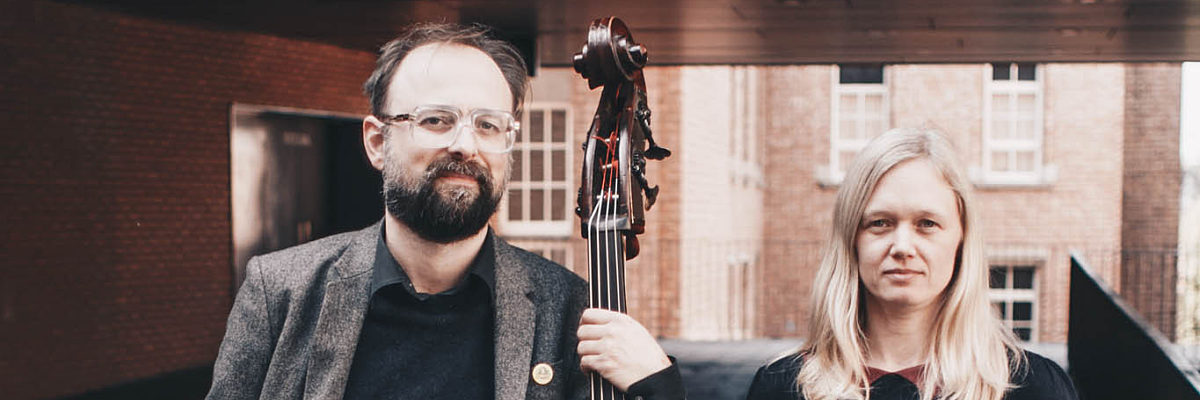
Charlotte Vanden Eynde & Nicolas Rombouts - Hyphen

Double bass player and composer Nicolas Rombouts and dancer/choreographer Charlotte Vanden Eynde met in 2015 when they were invited to perform a public improvisation in Brussels. It became the start of a special artistic interaction where dance and music formed a unity despite being two equal partners. Both Rombouts and Vanden Eynde work intuitively while keeping mental control, as a form of thinking. Improvising together means thinking together. The concept of thinking together, as two parts of the same brain that can also function autonomously, is the starting point of Hyphen. This season, they want to do interdisciplinary research in order to create a vocabulary and test the concepts for a performance. In what way will there be room for improvisation? Is the structure fixed or is it rather a set of loose elements? What is essential, is the power and vulnerability of acting and the presence in the here and now.
Charlotte Vanden Eynde (°1975, Belgium) is dancer and choreographer, working and living in Ghent. Between 1996 and 1999 she studied contemporary dance at P.A.R.T.S. Brussels. Since 1997 she has been creating choreographies and performances, focusing on the body in a very visual and sensitive way. Her early work tackled themes such as vulnerability, intimacy and femininity. In Lijfstof and MAP ME she looked for the borders with visual arts by exploring the body as material. With the solos I'm Sorry It's (Not) A StoryandShapeless she developed her own dance language, a research that also resulted in several impro solos on location. Her most recent performance Deceptive Bodies shows a silent choreography of the theatrical body and is also performed in museum spaces. She often works with other choreographers, theatre makers, film makers and musicians. Next to that, she is a regular movement advisor for other makers, and leads workshops based on her own practice.
Nicolas Rombouts (1977) is composer, producer and double bass players. Since he learned to play the double bass as an autodidact in his teens, it has always been the love of his life. From the very beginning, research into the full scope of the entire sound spectre has been key - a research that crosses the boundaries between musical genres. From a fascination for sound and improvisation, Nicolas created 'Soirées Flexibles' in 1999. During this monthly session, he created music with national and international impro musicians such as Peter Kowald, Mauro Pawlowski, Peter Jaquemyn, John Russel, Fred Van Hove, Joachim Badenhorst and more. In 2001 he started the jazz programme at the Lemmens Institute, studies he carried on at the Antwerp Conservatory. During his studies 'jazz and light music', the improvisatory aspect stayed a leitmotif in the acoustic approach of his instrument.
In 2003 Nicolas and Gregory Frateur founded the band Dez Mona, focusing more and more and composing songs. The story would last for 13 years, across 10 albums and some 100 concerts in Belgium and abroad. Next to that, he played bass for bands like BRZZVLL, Stanton, Guido Belcanto, alt country phenomenon Jim White and recently Stef Kamil Carlens and Tom Lanoye.
As part of Dez Mona, Nicolas collaborated with people like Paul Webb (Talk Talk) and Jo Francken (producer for a.o. Admiraal Freebee, ZAZ, The Colorist Orchestra,…). These personalities helped him on the way to recording, producing and mixing. A path that resulted in the creation of his own recording studio Caporal, where the likes of Stijn Meuris, Dez Mona, Guido Belcanto, Matt Watts, Lily, have recorded albums.
Whether he works on recording other people's music, composing for theatre and dance (Artemis, Het Zuidelijk Toneel, Behoud de Begeerte, Kaaiman, In Vitro, ...) writing film music (Jan Van Dijck's short films, Steve Haisman's documentary on the legendary Russin Slava clowns family, ...), Nicolas will always paint his musical development with sound colours (however abstract they may be). His music is very visual, referring to cities and places that no longer exist.
Recent years saw an elaboration of experiment and the development of an own language on double bass, for instance by using more effect pedals. Nicolas tries to develop his research in experimental projects such as the Wim de Busser quartet, Bert Dockx' new band, or with partner in crime Simon Lenski. With Lenski, Nicolas builds up a long-term colllaboration, further investigating the performative aspect of playing music. They have played short duo performances at B.O.X.'s Mix Mass night in DeSingel, earlier this year.
